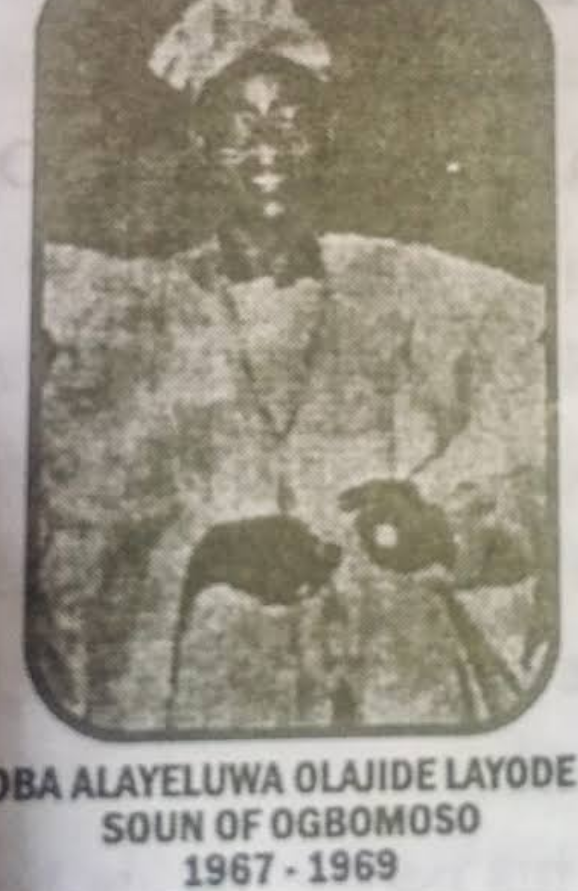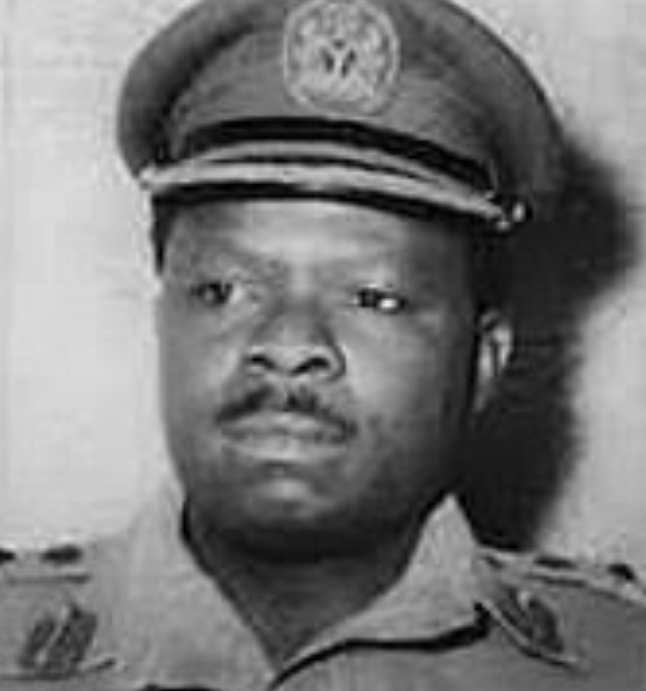By Richard Akinnola
The agitated inhabitants of the town numbering at least 1000, gathered in front of the palace of Soun of Ogbomosho, Oba Olajide Olayode. Majority of the restless inhabitants were members of Agbekoya Society, a society made up of farmers. The purpose of coming to this meeting was to resolve the impasse over the payment of increased tax.
Soun Olayode had calmed frayed nerves at the meeting, stating that he would convey their grievances to the appropriate quarters. Prior to this peace meeting of July 1, 1969, there had had been anti-tax demonstrations by the Agbekoya in 1968 in Akanran, near Ibadan, where a number of policemen were killed.
The issue of tax in the area was so topical and volatile that Brigadier (then Colonel) Benjamin Adekunle, pleaded with the Ogbomosho people to pay tax and avoid further trouble. He made the plea on June 23, 1969 when he was being conferred with the title of Ashipa of Ogbomosho.
Said Col. Adekunle: “It is a shame to find Ogbomosho as it is today. The only way to get more amenities and pave way for development is for everyone of you to pay his tax. If you don’t pay your tax, you can’t get anything from government.”
Eight days after, hell was let loose in Ogbomosho. Barely three hours after the Soun met with the 1000 inhabitants on July 1, 1969, three lorries filled with armed policemen, stormed the town, and sporadic shooting started. This action irked the Agbekoya, who felt that the Shoun had reneged on this plea for peace but rather invited policemen to the town.
Like a well-organized guerrilla fighting group, the Agbekoyas immediately mobilised their members, carrying dangerous weapons like cutlasses, axes, spears, clubs and charms and were chanting war songs as they marched on the palace of the Soun.
The Oba quickly sensed trouble, and in company of his brothers, Ladipo Olayode and Oladiran Olayode, as well as two of his messengers, Bello Okeyiola and Tijani Akanni, scurried into the room of one Abudu in the Palace. At this stage, the Palace had been torched by the orate Agbekoyas.
Soun made another determined move to escape as he whirled to the room of one Jempe, from where he scampered to the house of one Olayiwola within the palace compound, where he was eventually caught.
As soon as he was captured, he was dragged out by the crowd which attacked him with clubs and machetes. He died immediately. Then, the gory dismemberment began. First, his head was savagely severed; his hands and feet cut off, his intestines chucked out, leaving his abdomen open and empty. There after, the body was doused in petrol and set ablaze. The jubilant Agbekoyas thereafter carried the head of the Oba round the town in procession, until it was disposited at the shrine of their leader Jimoh Adisa.
Through fetish means, the Agbekoyas got the uniforms of the policemen dispatched to quell the uprising, stucked to the bodies of the policemen like gum.
As policemen could not douse the uprising, the Commanding Officer of Ibadan Garrisons of Nigeria Army, Col. Oluwole Rotimi sent a reinforcement of soldiers to quell the riot. The then Governor of Western state, Brigadier Adeyinka Adebayo quickly went on air to broadcast to the people for calm.
His words: “The unprecedented savagery with which the latest disturbances have been executed, the massacre of the innocent, the outrageous dismemberment of the body of the Oba after his shameless killing, distort the proud heritage of Yoruba customs and traditions and violate the long-cherished privilege of a Yoruba Oba…. Neither the Police, nor the army could be accused of having provoked the perpetrators of these acts because raids on tax defaulters had not even started. But a few misguided people took it upon themselves to ambush and kill innocent officers of the law in one area, and to murder others in cold blood in another area.”
Investigation began and seven persons, in charge No.1/15C/69 were arrainged before Justice Akinola Aguda at Ibadan High Court. They were Momodu Oladele, Jimoh Ajao Amoo alias Olojukan, Jimoh Aranda Atufala, Ezekiel Oyebamiji, Salami Aknji alias Onimoto, Asifatu Ishola and Jimoh Adisa.
The first accused person, Momodu Oladele in his statement to the police had pleaded an alibi, stating that he was in Jos on the day of the incident. But this was found to be false. The first prosecution witness (P.W.1), Ladipo Olayode, a brother to the Soun, testified that he saw the first accused as part of those who attacked the Oba in the Palace and that the accused was one of those who rushed into Olayiwola’s house and dragged out the Oba to where he was killed.
The second accused, Jimoh Amoo, in his statement to the police, said: “When I heard that the police entered the town and were beating people, I came out with my spear, I proceeded to His Highnesses Palace.” He, however, denied that he used the spear Oba. But the first, second and third prosecution witnesses, Ladipo Olayode, Bello Okeyiola and Tijani Akanni told the court that they actually saw the second accused in the crowd, carrying a(Ext.’P) and that he actually used the spear Oba.
One of the accused, Asifatu Ishola, made this revealing statement to the police. “At about 3p.m, the whole town was in confusion. We were hearing gunshots. Garba of Akogun’s compound went to the town. He came back to tell us that the police had entered the town, that the police fired and the Kabiyesi had fired Alaska. Then, the whole of us Agbekoya members at Mosifa gathered together and we headed to the Palace of the Kabiyesi. Some people held cudgels, some matchetes, some guns. I held a cudgel and a whip, while Garba held a cudgel.
Getting to the palace, we were looking for the Kabiyesi, but we did not see him. Many of us entered the palace, myself included. We looked for the Kabiyesi but he was not seen. He was later found in Layi’s room. I did not enter with them… he had been murdered before they brought him to us where I was standing in the Palace. When he was brought to us, his head and legs had been severed. When I saw that the condition with which he was brought to us was too bad, I brought out one pound which was used to purchase the petrol used to brun the remains. I bought the petrol myself.”
Justice Aguda said of this statement: “If he did not conceive the idea of murdering the Oba, he could have expressed shock at seeing the Oba murdered or at seeing his dead body and would never have used one pound of his own money to buy petrol to burn the body.”
Justice Aguda condemned five of them to death. They were Momodu Oladele, Jimoh Amoo, Jimoh Atufala, Salami Akanji and Asifatu Ishola. He discharged and acquitted Ezekiel Oyebanji and Jimoh Adisa. The five condemned men went to the Western State Court of Appeal, which upheld the death sentences passed on the four of them and discharged Salami Akanji alias Onimoto.
The remaining four went to the Supreme Court and their appeals were dismissed on January 11,1972 by Justices Sir Adetokunbo Ademola, G.B.A. Cooker, Sir Udo Udoma and Atande Fatayi-Williams.
Apart from the case of these four persons, another person, Ayantoyinbo Alada was separately charged to court for murder in respect of the death of the Oba. He was charged before Justice Agbaje of Ibadan High Court. He was said to be one of the people that dragged the Oba from Olayowola’s room and murdered him.
His statement to the police read: “That day, when the Oba was murdered, I observed that the whole compound was filled up. We were all members of Agbekoya. From there, we started going to the house of the Kabiyesi. Before we left, our chairman, Jimoh Adisa told us to go and bring the head of the Kabiyesi. The whole of us shouted. We headed for the Kabiyesi’s Palace. It was Garba Oyeniyi the chairman that instructed us to go and bring the Kabiyesi’s head to him.”
The judge found Alade Ayantoyinbo guilty and condemned him to death. He went to the Western State Court of Appeal and lost and still proceeded to the Supreme Court which on January 12,1972 affirmed the death sentence.
In its summation, the Supreme Court lead judgement read by Justice Udo Udoma said: “Before us, Mr Onalaja(later Justice Onalaja) who appeared for the appellant, quite rightly, in our view, intimated that after a careful scrutiny of the records, he could find nothing he could usefully urge on behalf of the appellant… We were satisfied the appellant was rightly convicted, and we therefore dismiss the appeal.”
Culled from the book, ‘Famous murder trials in Nigeria’ by Richard Akinnola
Dear readers, we really need your support to keep on serving you with authoritative, truthful, and juicy stories everyday. For your support, please reach out to the editor @gavelinternational66@gmail.com



